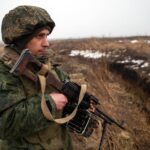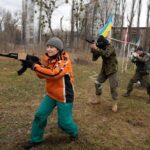By Andrew Osborn and Dmitry Antonov
MOSCOW (Reuters) -Russian President Vladimir Putin told the leaders of France and Germany on Monday that he planned to sign a decree recognising the two breakaway regions in eastern Ukraine as independent entities shortly, the Kremlin said.
The French and German leaders voiced disappointment after hearing the decision, the Kremlin said in a readout of the phone calls. Moscow’s move is also likely to torpedo a last-minute bid for a summit to prevent Russia from invading Ukraine.
Separately, Moscow said Ukrainian military saboteurs had tried to enter Russian territory in armed vehicles leading to five deaths, an accusation dismissed as “fake news” by Kyiv.
Both developments fit a pattern repeatedly predicted by Western governments, who accuse Russia of preparing to fabricate a pretext to invade Ukraine by blaming Kyiv for attacks and relying on pleas for help from separatist proxies.
Recognition by Moscow of the rebel regions’ independence will narrow the diplomatic options to avoid war, since it is an explicit rejection of a seven-year-old ceasefire mediated by France and Germany, touted as the framework for future negotiations on the wider crisis.
Hours earlier, French President Emmanuel Macron gave hope of a diplomatic solution, saying Putin and Biden had agreed in principle to meet.
But the Kremlin said there were no specific plans for a summit. The White House said Biden had accepted the meeting “in principle” but only “if an invasion hasn’t happened”.
In Washington, President Joe Biden summoned his top security advisers. Secretary of State Antony Blinken, Defense Secretary Lloyd Austin and General Mark Milley, chairman of the U.S. Joint Chiefs of Staff, could be seen entering the White House on the President’s Day holiday.
Washington says Russia has massed a force numbering 169,000-190,000 troops in the region, including the pro-Russian rebels in the breakaway regions in eastern Ukraine, and could invade within days. The recognition of the rebel-held areas could also provide a pretext for Russian troops to cross the border into those areas.
Russia denies any plan to attack its neighbour but has threatened unspecified “military-technical” action unless it receives sweeping security guarantees, including a promise that Ukraine will never join NATO.
European financial markets tumbled at the signs of increased confrontation, after having briefly edged higher on the glimmer of hope that a summit might offer a path out of Europe’s biggest military crisis in decades. The price of oil – Russia’s main export – rose, while Russian shares and the rouble plunged. [MKTS/GLOB] [RU/RUB] [O/R]
(Reporting by Reuters bureaux; Writing by Kevin Liffey, Peter Graff and Frank Jack Daniel; Editing by Hugh Lawson)




